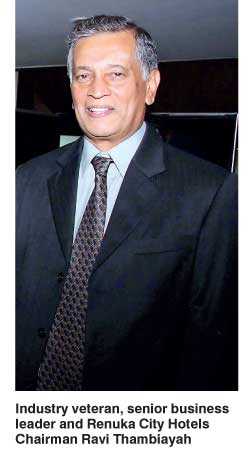Friday Feb 20, 2026
Friday Feb 20, 2026
Monday, 10 September 2018 00:33 - - {{hitsCtrl.values.hits}}
Industry veteran and senior business leader Ravi Thambiayah has expressed concerns over a number of worrying conditions in the tourism sector, including a drop in occupancy and revenue for hotels.
 In the Chairman’s Review in the Renuka City Hotels PLC’s 2017/18 Annual Report, Thambiayah said that as per the monthly statistics published by the Sri Lanka Tourism Development Authority (SLTDA), tourist arrivals have increased only by 7% during the financial year under consideration compared to the previous year. The total number of tourists that arrived were 2.2 million, compared to 2.07 million last year.
In the Chairman’s Review in the Renuka City Hotels PLC’s 2017/18 Annual Report, Thambiayah said that as per the monthly statistics published by the Sri Lanka Tourism Development Authority (SLTDA), tourist arrivals have increased only by 7% during the financial year under consideration compared to the previous year. The total number of tourists that arrived were 2.2 million, compared to 2.07 million last year.
“This is far from satisfactory to meet the growth of supply in the industry. In addition, hotels registered with the SLTDA have not seen a corresponding increase in occupancy or revenue despite this increase, which is a worrying condition for the tourism industry,” Thambiayah said.
In the Renuka City Hotels PLC 2017/18 Annual Report, the Chairman listed three broad factors that clearly contribute to the decline in occupancy and revenue of hotels in the country.
1. The lack of collective marketing of Sri Lanka as a destination has resulted in the country not attracting the right type of tourists. Merely an increase in the number of tourist arrivals will not add value to the industry. An increase in per tourist spending along with increases in arrivals is needed to ensure sustainability of the sector. In addition, the type of arrival numbers that are being recorded could be diluted due to the inclusion of port workers, for example, who are entering the country on a tourist visa but not necessarily residing in hotels. There needs to be a better mechanism in place to compute statistics in respect to actual tourist arrivals, so that the construction of hotels and the issuance of licences to open new hotels could be based on more accurate figures.
2. Secondly, recent statistics state that whilst there are approximately 24,000 registered rooms accounted for at the SLTDA, there are approximately 90,000 unregistered rooms available for sale in comparison. These ‘informal players’, which include luxury villas, and apartments that sell their rooms on a daily basis, currently do not pay any statutory levies, fees and/or any taxes. This has resulted in a huge disparity in respect of rates that the ‘informal’ sector can charge in comparison to what guests residing in formal sector accommodation are liable to pay. This creates an uneven playing field posing further challenges to the sustainability and existence of the formal sector. We have hope that the authorities will take initiatives to bring the informal sector within a regulated framework and bring them into the tax net. The task of registering the informal sector establishments has recently been identified in the SLTDA’s Tourism Strategic Plan 2017-2020 and ‘mainstreaming’ these properties in the informal sector has been listed as a priority as the SLTDA acknowledges the existence of the informal sector as a standards and compliance risk for all stakeholders. However, registering them alone will not create a level playing field. While we appreciate that small enterprises which truly provide a ‘home stay’ should be given incentives to develop and be taught to maintain quality and standards, the grave concern shared by a lot of registered establishment owners and operators is that in a market where there is already an excess of room inventory offered by the registered/formal sector, whether there is any more room to develop another entire sector without having far reaching implications.
3. A third reason could be the actual growth in supply of the formal sector. 250 new hotels are in the pipeline to be constructed, resulting in a total of approx. 650 hotels in the country. This disparity in supply and demand levels will lead to further competition, unhealthy pricing and lowering service standards among the formal sector stakeholders.
The industry and authorities should together address the severe shortage of skilled and unskilled labour in the hotel industry, the shortage of food supplies (seafood, meat, etc.) and the inadequacy of a well-developed road, rail and domestic airline infrastructure. If these issues are not resolved in a timely manner, the industry will soon be left in a dire strait. The Government should realise the importance of this sector and should give due place for it to flourish as one of the most important sectors.
Though concerned with the overall outlook of the hotel sector, Renuka City Hotels PLC, thanks to other income, had managed to remain profitable, though lower in comparison to FY17. The Hotel saw occupancy of 77%, down from 82% in the previous year.
Revenues in FY18 declined to Rs. 256.5 million, from Rs. 268 million in the previous year whilst gross profit dipped from Rs. 212 million to Rs. 196 million. Profit from operations declined from Rs. 201 million to Rs. 168 million. This was despite other operating income rising from Rs. 91 million to Rs. 169.5 million. The Company saw salaries and related expenses gain from Rs. 35.3 million to Rs. 84 million. Pre-tax profit amounted to Rs. 340 million, down from Rs. 394.5 million in FY17. Finance income was Rs. 170.8 million, lower compared with Rs. 193.6 million in the previous year. Post-tax profit was Rs. 343.7 million, down from Rs. 380.1 million.
The Company has declared a Rs. 6 per share dividend for FY18, same as in recent years.
Renuka City Hotels PLC Board of Directors comprises of R. B. Thambiayah (Chairman),N. A. Thambiayah (Deputy Chairman), S. R. Thambiayah (Jt. Managing Director), A. L. Thambiayah (Jt. Managing Director), M. A. Jayawardena, R. S. Tissanayagam, C. S. Wijeyeratne, N. R. Thambiayah, and H. M. N. S. Gunawardana.
Renuka Hotels Group posts stellar results; ups post-tax PROFIT by 31% to Rs. 868.5 m
Newly listed Renuka Hotels PLC has ended the 2017/18 Financial Year on a strong footing with the Group’s after-tax profit of Rs. 868.5 million, sharply up by 31% from Rs. 663.3 million in the previous year.
Pre-tax profit was Rs. 870.1 million up by 24% as against Rs. 700.2 million in FY17.
Group revenue amounted to Rs. 481.2 million, down from Rs. 491 million. Gross profit dipped from Rs. 371.4 million to Rs. 348.4 million.
Profits had been boosted by robust other income, which grew by over three times to Rs. 742.6 million. Other income consists of realised gain on financial assets available for sale (Rs. 577.4 million as against Rs. 2.2 million in FY17) and dividend income of Rs. 160 million, though lower from Rs. 241.6 million in the previous year. In FY18, the Group sold 986.5 million worth of financial assets in comparison to Rs. 3.8 million in FY17. As at 31 March 2017, it had Rs. 4.04 billion in financial assets for sale and it had come down to Rs. 3.8 billion as at end FY18. Financial assets held to maturity were Rs. 256.7 million up from Rs. 175 million.
The virtually debt-free Group also enjoyed Rs. 298 million in finance income up from Rs. 268 million a year earlier.

Renuka Hotels PLC Chairperson and Joint Managing Director S. R. Thambiayah said she was proud that despite severe competition, the Company was able to achieve a commendable occupancy of 79% during 2017/2018. Monthly statistics published bythe Sri Lanka Tourism Development Authority shows a mere 7% increase in the number of tourist arrivals during the year, which counts to approximately 2.2 milliontourist arrivals compared to a 2.07 million last year.
“There is a constant increase in the room supply to the market with new hotels coming up in the formal sector as well as the increase in room supply by the informal sector such as ‘home stay’ providers, etc.,” she said.
“Considering the severe competition created by the increase in room supply in the market, the occupancy can be considered as a remarkable achievement,” she added.
“The management and staff have been able to achieve this through their dedication and commitment to service excellence,” Thambiayah emphasised.
Total equity was Rs. 6.38 billion, inclusive of Rs. 4.7 billion in revenue reserves and Rs. 492 million in retained earnings. The directors have proposed a final dividend of Rs. 1.00 per share (2017 – final dividend of 80 cents per share) for the year ended 31 March.
The Board of Renuka Hotels PLC comprises of S. R. Thambiayah (Chairperson/Jt. Managing Director), N.A. Thambiayah (Deputy Chairman), A. L. Thambiayah (Jt. Managing Director), R.B. Thambiayah, S.R. Dominic, M.J. Fernando, G.U. Nanayakkara, S. Nagendra, M. A. Jayawardena, N. R. Thambiayah, and R. N. Asirwatham.